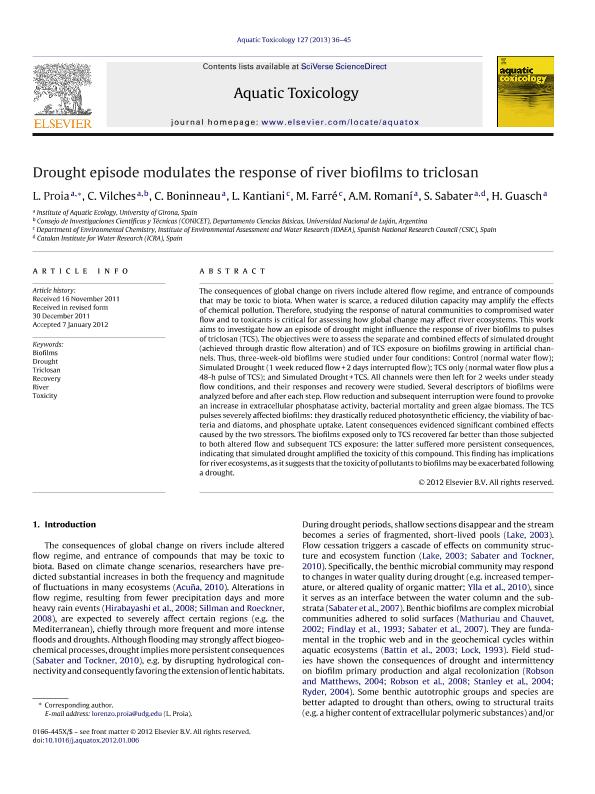Artículo
Drought episode modulates the response of river biofilms to Triclosan
Proia, L.; Vilches, Carolina ; Boninneau, C.; Kantiani, L.; Farré, Maria Marcela; Romaní, Anna M.; Sabater Cortés, Sergi; Guasch, H.
; Boninneau, C.; Kantiani, L.; Farré, Maria Marcela; Romaní, Anna M.; Sabater Cortés, Sergi; Guasch, H.
 ; Boninneau, C.; Kantiani, L.; Farré, Maria Marcela; Romaní, Anna M.; Sabater Cortés, Sergi; Guasch, H.
; Boninneau, C.; Kantiani, L.; Farré, Maria Marcela; Romaní, Anna M.; Sabater Cortés, Sergi; Guasch, H.
Fecha de publicación:
02/2013
Editorial:
Elsevier Science
Revista:
Aquatic Toxicology
ISSN:
0166-445X
Idioma:
Inglés
Tipo de recurso:
Artículo publicado
Clasificación temática:
Resumen
The consequences of global change on rivers include altered flow regime, and entrance of compounds that may be toxic to biota. When water is scarce, a reduced dilution capacity may amplify the effects of chemical pollution. Therefore, studying the response of natural communities to compromised water flow and to toxicants is critical for assessing how global change may affect river ecosystems. This work aims to investigate how an episode of drought might influence the response of river biofilms to pulses of triclosan (TCS). The objectives were to assess the separate and combined effects of simulated drought (achieved through drastic flow alteration) and of TCS exposure on biofilms growing in artificial channels. Thus, three-week-old biofilms were studied under four conditions: Control (normal water flow); Simulated Drought (1 week reduced flow + 2 days interrupted flow); TCS only (normal water flow plus a 48-h pulse of TCS); and Simulated Drought + TCS. All channels were then left for 2 weeks under steady flow conditions, and their responses and recovery were studied. Several descriptors of biofilms were analyzed before and after each step. Flow reduction and subsequent interruption were found to provoke an increase in extracellular phosphatase activity, bacterial mortality and green algae biomass. The TCS pulses severely affected biofilms: they drastically reduced photosynthetic efficiency, the viability of bacteria and diatoms, and phosphate uptake. Latent consequences evidenced significant combined effects caused by the two stressors. The biofilms exposed only to TCS recovered far better than those subjected to both altered flow and subsequent TCS exposure: the latter suffered more persistent consequences, indicating that simulated drought amplified the toxicity of this compound. This finding has implications for river ecosystems, as it suggests that the toxicity of pollutants to biofilms may be exacerbated following a drought.
Palabras clave:
Biofilms
,
Drought
,
Triclosan
,
Recovery
,
River
,
Toxicity
Archivos asociados
Licencia
Identificadores
Colecciones
Articulos(SEDE CENTRAL)
Articulos de SEDE CENTRAL
Articulos de SEDE CENTRAL
Citación
Proia, L.; Vilches, Carolina; Boninneau, C.; Kantiani, L.; Farré, Maria Marcela; et al.; Drought episode modulates the response of river biofilms to Triclosan; Elsevier Science; Aquatic Toxicology; 127; 2-2013; 36-45
Compartir
Altmétricas



